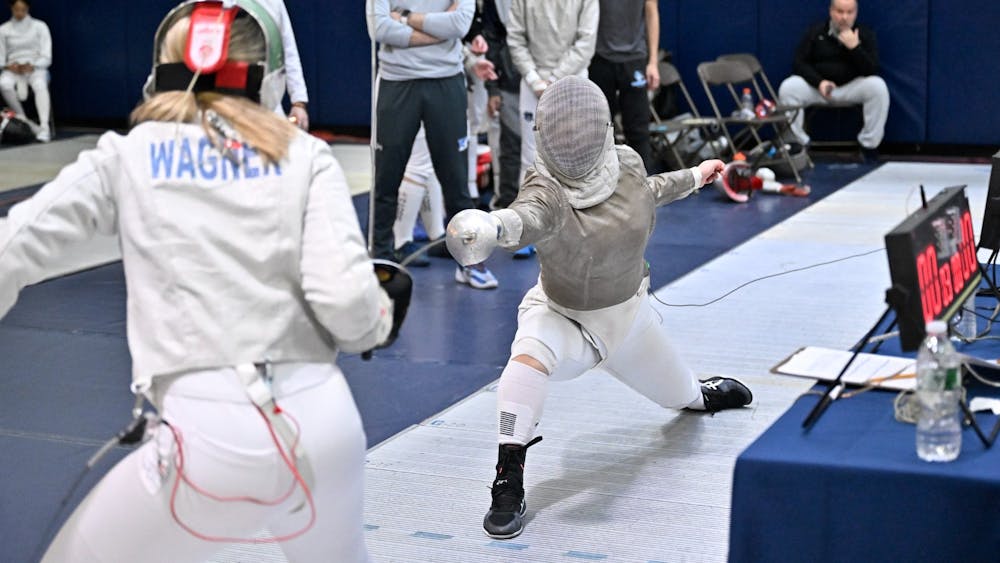Josephine Chang’s love for fencing started with another passion: reading. As a child, the fantasy novels she read were alive with characters who practiced archery, horseback riding and sword fighting. Then, her first club moved into town, just one minute down the street... and the rest is history.
I say is history because despite her incredibly impressive achievements — she is currently ranked 14th for career sabre wins in Johns Hopkins History — Chang is still a sophomore. A sophomore who, on Feb.18 of this year, won the Sabre Title at the Eastern Women’s Fencing Competition (EWFC) as Hopkins Women’s Fencing bagged their fifth championship in a row.
But the season is far from over. This Saturday, March 2, the team will be traveling to Madison, NJ to compete in the National Intercollegiate Women’s Fencing Association (NIWFA) Championships. A week after that, they’ll be at the National Collegiate Athletics Association’s Regionals.
She’s also quite accomplished off the piste. In an interview with The News-Letter, Chang spoke about her career plans and research interests as a neuroscience major and computer science minor. At the moment, she’s currently involved with the Nauen Lab, working on a project that aims to outline the cell bodies of neurons in the hippocampus by running an algorithm on microscopic images. She emphasized how thankful she is for the opportunity to work at Dr Nauen’s lab, and expressed her appreciation for the research environment at Hopkins.
“I think it’s one of the best things at Hopkins that you can so easily reach out to professors and find opportunities in such niche fields,“ she commented.
I asked her how she makes it work. The pressure of being a Hopkins student can sometimes be overwhelming, even without entire weekends on the road and hours of training each week.
“It’s tough. Last semester, I put my myself through some challenging coursework, and I knew it would be [challenging],“ she said. “It’s really interesting to see how in this semester, now that I don’t have as much, I’m like ‘wow, life is good again.’”
Josephine also emphasised that it’s important to consider the impact your coursework will have outside of your academics.
“You don’t think about like ‘oh, what’s my mental health going to be like?’“ she noted. “How much energy am I going to have to put into practice when I’m running on so little sleep, because at the end of the day, there’s only so much time you have in a day, right? So it’s definitely a tough time of time management.”
This is especially relevant in fencing because of the sheer amount of mental energy that playing “physical chess” takes up. Chang tells me her sport requires athletes to be extremely focused, but, at the same time, they can’t overthink. Distractions can really interfere with your efforts, which is why the team has recently been working with the mental health coordinator for athletics, Brock Turnbaugh. Chang described how the process of adapting to college-level fencing can be challenging.
“Fencing from the beginning is kind of an individual sport. But with how the college format is set up, everyone fences their individual bout, and then the cumulative win is based on how many wins you get versus the other team’s wins,” she explained.
According to her, athletes can react to this change differently.
“Some people are like ‘oh, I feel like there’s less pressure because there is more of us,’” she said. “While others are like ‘I feel like I can drag others down’.”
On the subject of her team, I asked her what it’s like being a part of the women’s fencing team and of the wider student-athlete community. She laughed as she told me how, this year, all of her roommates are fencers, and she will also be living with members of the team next year.
“I love my team,” she emphasized. “It’s forever changed my experience of Hopkins because of the inbuilt community that you have.”
From our conversation, it became clear that the team is a tight-knit, supportive community not just in competition, but all throughout the semester.
In addition, Chang also enjoys being a part of the wider sports community, in particular the collective meetings, and hopes to be able to attend other sporting events more frequently. I inquired if there are any sports she hasn’t been able to see yet that she would like to.
“Field Hockey! I kind of want to see a field hockey game,” she answered.
To wrap things up, I asked Chang two final questions. One, did she have any practical advice for the wider Hopkins community as a student-athlete, and two, what is something she hasn’t done at Hopkins that she would like to do? She laughed as she answers the first one: stretching.
“I think everyone could take a little time out of their day and do a 10-15 minute stretch,” she explained. “Sitting at a desk, your back gets tense, so get on the floor and do some back stretches — pull your knees over. That’s super important.”
As for the second question, she told me that she wants to get involved in more clubs and attend more talks.
“There are so many talks and accessible people who have done this incredible research, especially with computational neuroscience that I’m interested in, and I feel like I haven’t had the time to go to because I’m always at practice,” she said. “Once the competitions die down, I would like to go to more club meetings, cause I’ll have my weekends open.”
Keep an eye out for the Women’s Fencing team this weekend, as they head to New Jersey for the NIWFA Championships!





